Trump bandwagon still speeding down tracks
- Published
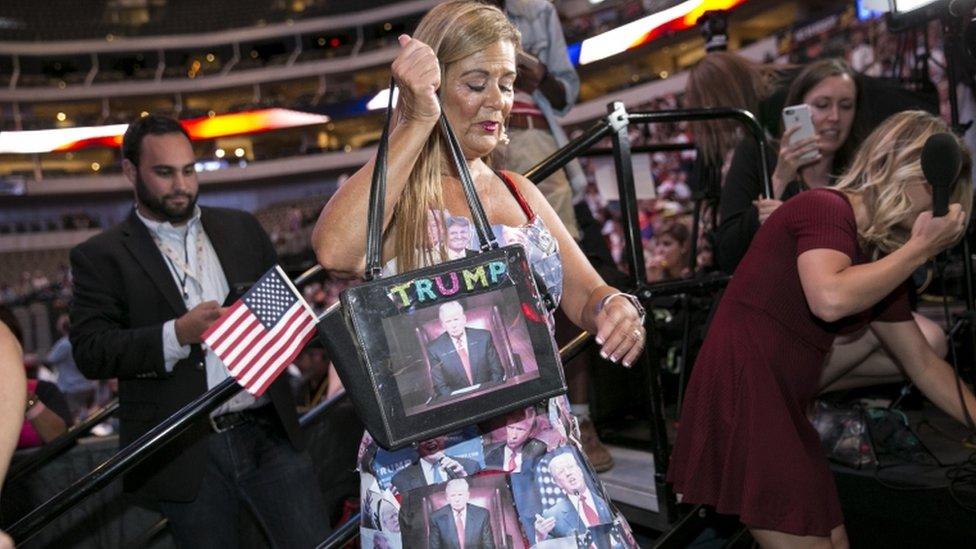
The rally attracted adoring supporters
"The silent majority stands with Trump," proclaimed the posters.
But in truth, there was nothing very silent about this raucous audience who packed the American Airlines Center in Dallas.
Twenty thousand people waited in the sun and heat to gain access to the arena. They dressed in costumes, they wore badges and hats and T-shirts.
And once inside they shouted.
Sometimes they booed and jeered - mention Jeb and they booed; mention Hillary and they booed even louder.
And when Trump mentioned Trump - which he did quite a lot (if anyone did a word cloud I'm sure that Trump was the word he used most) they cheered.
There were other bogeymen too - China, Japan and Mexico also brought howls of derision. Mention of illegal immigrants brought howls of rage.
This was politics as pantomime. With plenty of villains. And only room for one hero. Yes, we know who that was...
He spoke for nearly an hour without a teleprompter. The speech was in two halves.
The first was Trump on Trump - where he spoke about the money he had made: $200m plus, just from presenting The Apprentice.
How he had deals galore in the pipeline.
But how everything had been put on hold to allow him to run for the Presidency.
And here was the political point.
No 'bloodsuckers'
Other candidates had to make no sacrifices because they were professional politicians, but because he was a top-of-his-game business tycoon, he was going to lose a lot of money by his tilt for the White House (I think he'll be OK though).
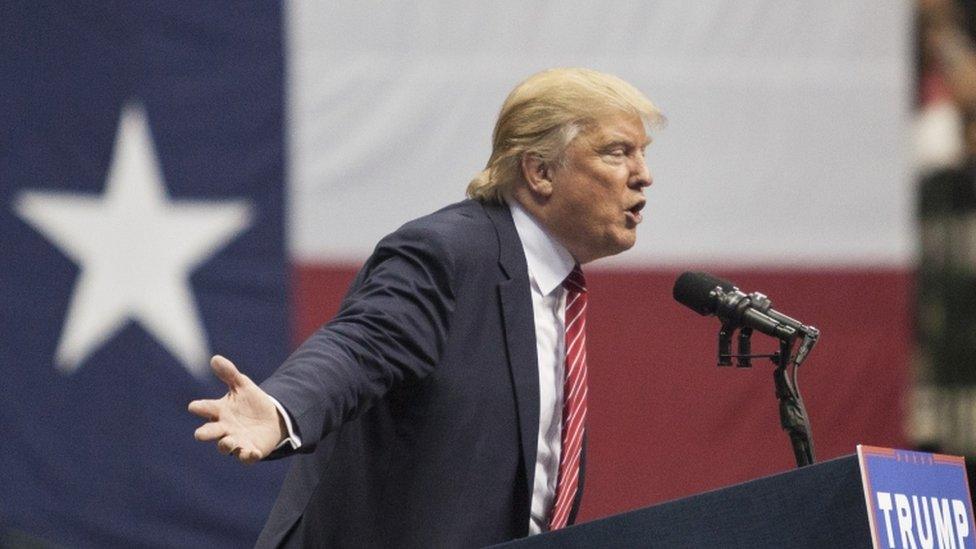
Donald Trump in full flow
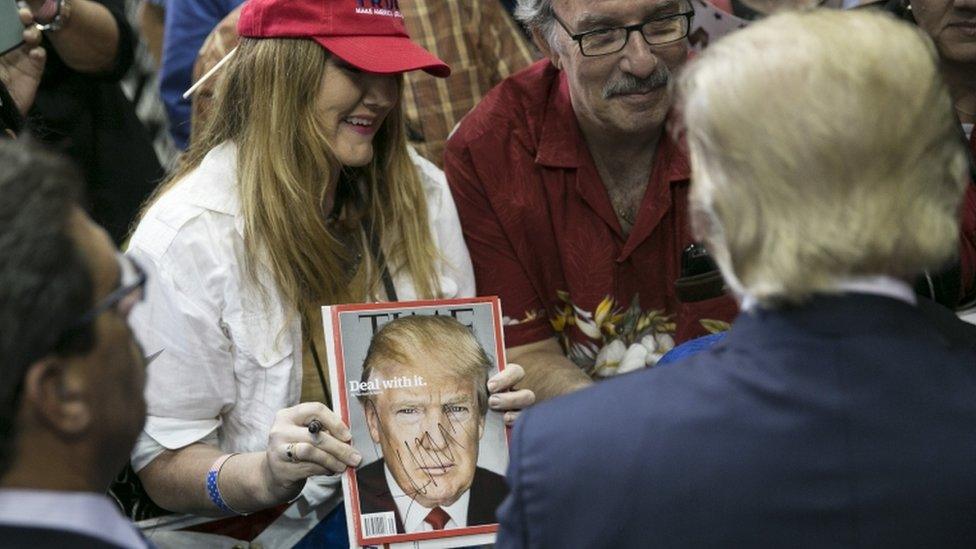
Trump received an enthusiastic response
And second political point, because he was so rich, he was funding this campaign himself and wouldn't be in the pocket of any of the "bloodsuckers", as he called the money men, the lobbyists, the corporate wheelers and dealers.
He talked about the polls: "We're killing it," he repeatedly declared.
He said he was way out in front.
But he complained that the media refused to admit he was surging, focusing instead on the campaigns of his rivals.
Again a clever way to portray him as the outsider; the upsetter of orthodoxy, the insurgent tearing at the walls of conventional politics.
And then - finally - a ramble through policy.
On women: "I have such respect for women, I cherish women, I'm going to take such good care of women's health care issues you won't even believe it."
On trade deals, he was going to stop jobs going abroad.
On illegal immigration - and here in Texas, which shares a common border with Mexico - those who shouldn't be in the US would be kicked out. He would build a wall.
A beautiful wall, a Trump wall. That got an ecstatic reaction.
He promised to unveil detailed tax and growth policies in the next three weeks.
And let us be honest, detail is something that has been thin on the ground thus far.
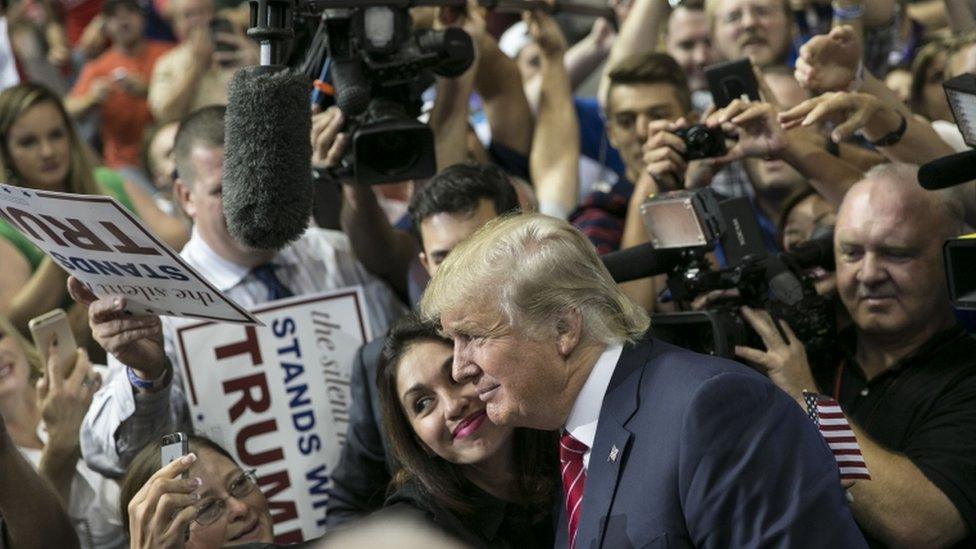
Trump said he "cherished" women
Obamacare would be reformed, veterans would be treated better.
And then he brought his speech to a close with the slogan, "Make America great again."
This is the Donald Trump phenomenon and bandwagon.
It is 14 months to the election, and 20,000 people were packed into this sports arena in Dallas to hear him.
A lot of pundits predicted that his support would fizzle out after the summer.
It doesn't seem to be happening.

Donald Trump:
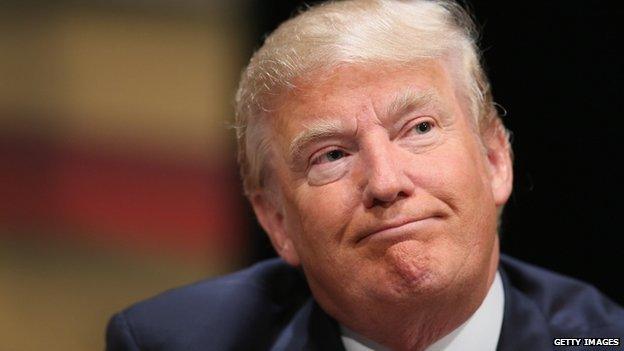
Riding high in the polls
1946: Born in Queens, New York
1959: Goes to New York Military Academy
1968: Graduates from Wharton School of Finance, University of Pennsylvania and starts working for his father's successful real estate development and construction company
1974: Acquires the failing Commodore Hotel on Manhattan's 42nd Street. The development takes nearly six years to complete before opening as the Grand Hyatt.
1982: Ahead of the Trump Tower completion, 266 luxury condos in the building go on sale, bought by Martina Navratilova, Johnny Carson, Steven Spielberg and Sophia Loren
1988: Buys New York's iconic Plaza Hotel for $407m, at the time the highest price ever paid for a single hotel
1991: Completion of Trump Palace, Upper East Side
1992: In a deal with the banks over his business debts, he is forced to give up his yacht, his jet, his stake in Grand Hyatt and the Trump Shuttle
1994: Averts bankruptcy again by getting banks to agree to another three years to pay back his debt
2003: Launch of the first series of The Apprentice
2011: Led "birther" speculation that Barack Obama was not born in the US
2015: Declares his intention to seek the Republican Party nomination in 2016
